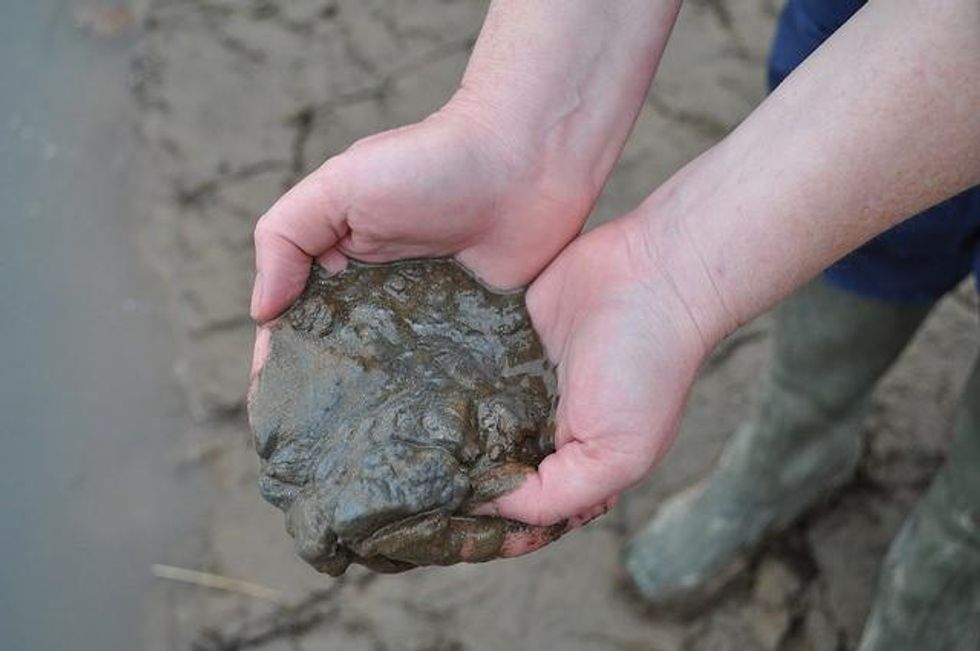Internal emails released Thursday by environmental lawyers confirm what activists have long charged: the North Carolina authorities tasked with regulating Duke Energy -- the company responsible for the Dan River coal ash disaster -- have been colluding with the corporation behind closed doors to undermine concerned environmental groups.
"These documents reveal a very cozy relationship between the N.C. Department of Environment and Natural Resources and Duke and a deferential approach from DENR to Duke," said Nick Torrey, Associate Attorney at the Southern Environmental Law Center, in an interview with Common Dreams.
In January 2013, the SELC announced plans to sue Duke Energy on behalf of environmental organizations over dangerous coal ash ponds near Asheville, North Carolina. This was soon followed by similar action regarding the Riverbend coal ash dump north of Mount Holly. "For a long time, they've known their coal ash ponds are leaking and polluting groundwater," said Torrey.
Under the federal Clean Water Act, citizens can sue a polluter to enforce environmental law. Yet, before they do so, they must give 60 days' notice to the polluter to ostensibly give that polluter the opportunity clean up its act, explained Torrey. However, a state agency can file its own lawsuit, and if it does so on the exact same claims raised in the 60 day notice letter, then those groups cannot file own suit in federal court.
"Each time we sent 60 day notice letters, on approximately the 59th day, the DENR would file its own enforcement action," said Torrey, explaining this effectively blocked the environmental suits.
Emails between Duke Energy and state regulators -- obtained through a public records request by the SELC -- show that, behind the scenes, the DENR engaged in closed-door negotiations with Duke Energy and communicated with them before intervening in the legal actions of environmental groups.
For example, when the DENR filed a suit to block the SELC suit over the Asheville site, an email from the DENR dated March 22 states, "All is well" and indicates that Duke's lawyer was present at DENR's office. Less than a week after they received a 60 day notice from SELC regarding the Riverbend plant, DENR began negotiating with Duke Energy on a settlement, an April 1 email shows.
Over the summer, Duke Energy reached a proposed settlement with the state that would require the $5 billion corporation to pay a $99,000 fine and "study" the potential effects of its pollution. "The agreement doesn't require Duke to take any real action," said Patrick Hunter, associate attorney for SELC, in an interview with Common Dreams.
After one of Duke Energy's coal ash ponds near Eden in February spilled tens of thousands of arsenic and lead-laden coal ash into the Dan River that flows through North Carolina and Virginia, federal prosecutors opened a criminal investigation into the relationship between the company and state regulators, putting the $99,000 settlement on hold.
Yet, environmental campaigners warn that the state and corporate structures responsible for the coal ash disaster remain firmly in place.
DENR has now sued Duke Energy for all of its 14 coal ash ponds across the state -- a move that Hunter said is likely aimed at preempting and undermining more hard-hitting suits from environmental groups.
"For years, and especially under the current state administration, the attitude toward these dangerous coal ash sites has been hands-off from the state, and the settlement that was proposed is more of the same," said Torrey. "It didn't apply to the Dan River site, but it was a template for how the state wants to approach issues of allowing the polluter to not take action."
_____________________

